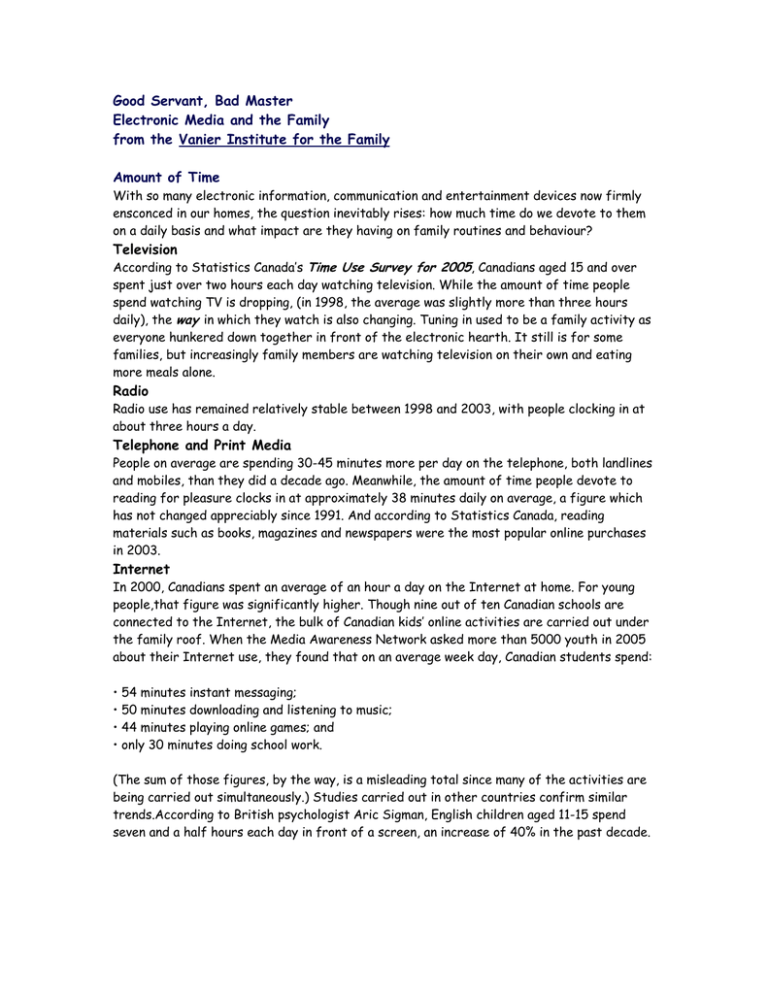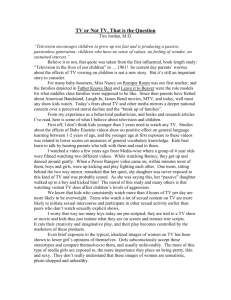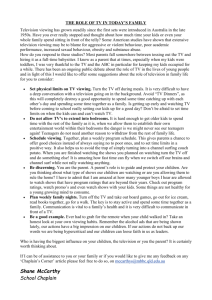Good Servant, Bad Master Electronic Media and the Family
advertisement

Good Servant, Bad Master Electronic Media and the Family from the Vanier Institute for the Family Amount of Time With so many electronic information, communication and entertainment devices now firmly ensconced in our homes, the question inevitably rises: how much time do we devote to them on a daily basis and what impact are they having on family routines and behaviour? Television According to Statistics Canada’s Time Use Survey for 2005, Canadians aged 15 and over spent just over two hours each day watching television. While the amount of time people spend watching TV is dropping, (in 1998, the average was slightly more than three hours daily), the way in which they watch is also changing. Tuning in used to be a family activity as everyone hunkered down together in front of the electronic hearth. It still is for some families, but increasingly family members are watching television on their own and eating more meals alone. Radio Radio use has remained relatively stable between 1998 and 2003, with people clocking in at about three hours a day. Telephone and Print Media People on average are spending 30-45 minutes more per day on the telephone, both landlines and mobiles, than they did a decade ago. Meanwhile, the amount of time people devote to reading for pleasure clocks in at approximately 38 minutes daily on average, a figure which has not changed appreciably since 1991. And according to Statistics Canada, reading materials such as books, magazines and newspapers were the most popular online purchases in 2003. Internet In 2000, Canadians spent an average of an hour a day on the Internet at home. For young people,that figure was significantly higher. Though nine out of ten Canadian schools are connected to the Internet, the bulk of Canadian kids’ online activities are carried out under the family roof. When the Media Awareness Network asked more than 5000 youth in 2005 about their Internet use, they found that on an average week day, Canadian students spend: • 54 minutes instant messaging; • 50 minutes downloading and listening to music; • 44 minutes playing online games; and • only 30 minutes doing school work. (The sum of those figures, by the way, is a misleading total since many of the activities are being carried out simultaneously.) Studies carried out in other countries confirm similar trends.According to British psychologist Aric Sigman, English children aged 11-15 spend seven and a half hours each day in front of a screen, an increase of 40% in the past decade. Meanwhile, a 2005 U.S. study of the media habits of youth between eight and eighteen years of age found that they spend an average of nearly six and a half hours daily with media, compared with: • about two and a quarter hours hanging out with parents • almost one and a half hours in physical activity • just under one hour doing homework and • about 30 minutes doing household chores. Since many kids are interacting with more than one medium at a time—on the Internet, watching TV and listening to music—they are actually squeezing approximately eight and a half hours of media content into those six and a half hours. What Parents Can Do Give kids age-appropriate rules and negotiate boundaries around media use Research results from various studies are consistent — parents can have impact if they choose to. Their guidance has a definite effect on their children’s behaviour, particularly at younger ages. Those who set rules have kids who spend less time with media and more time reading. Their expectations also shape young people’s Internet experiences. Kids, for instance, who livein homes with no rules about meeting online acquaintances or visiting sites with offensive content are more likely to be sexually harassed. • Limit the number of individually owned devices—computers, televisions and mobile phones— in homes, and move them out of bedrooms and into public spaces. There will be conflict over the use of these devices, but this is an opportunity to ‘teach’ negotiation and tolerance. • Limit the times at which they can be used. Don’t have the television on all the time, during meals and when no one is watching. Create times when mobile phones are switched off. One research study found that kids who live in homes where the televisionis on at all times or at least during meals are less likely to say they talk their problems out with their parents. • Develop rules about giving out personal information or visiting certain sites on the Internet. These rules make a real difference, especially with younger children. (They reduce the likelihood of kids making acquaintance with strangers from 34% to 16%.) Yet as MNET points out, students in grades eight and nine have only a third of the rules of younger kids at a time when they are most likely to make friends online and visit offensive sites. • Ensure that real-world rules around issues like bullying hold also for the virtual worlds in which young people increasingly live. • Negotiate the amount of time kids spend with their devices on a daily basis. Parental rules tend to focus much more on the content their kids are exposed to than the amount of time they invest each day in their media encounters.




